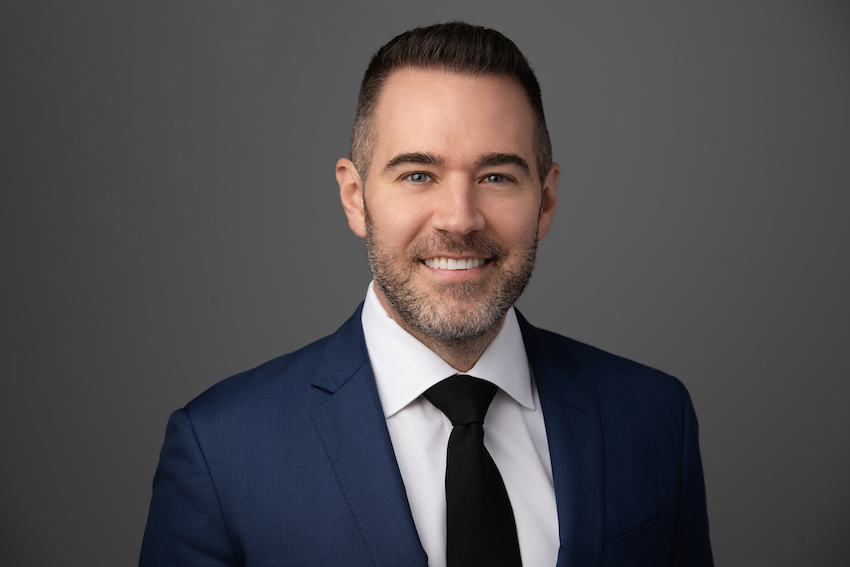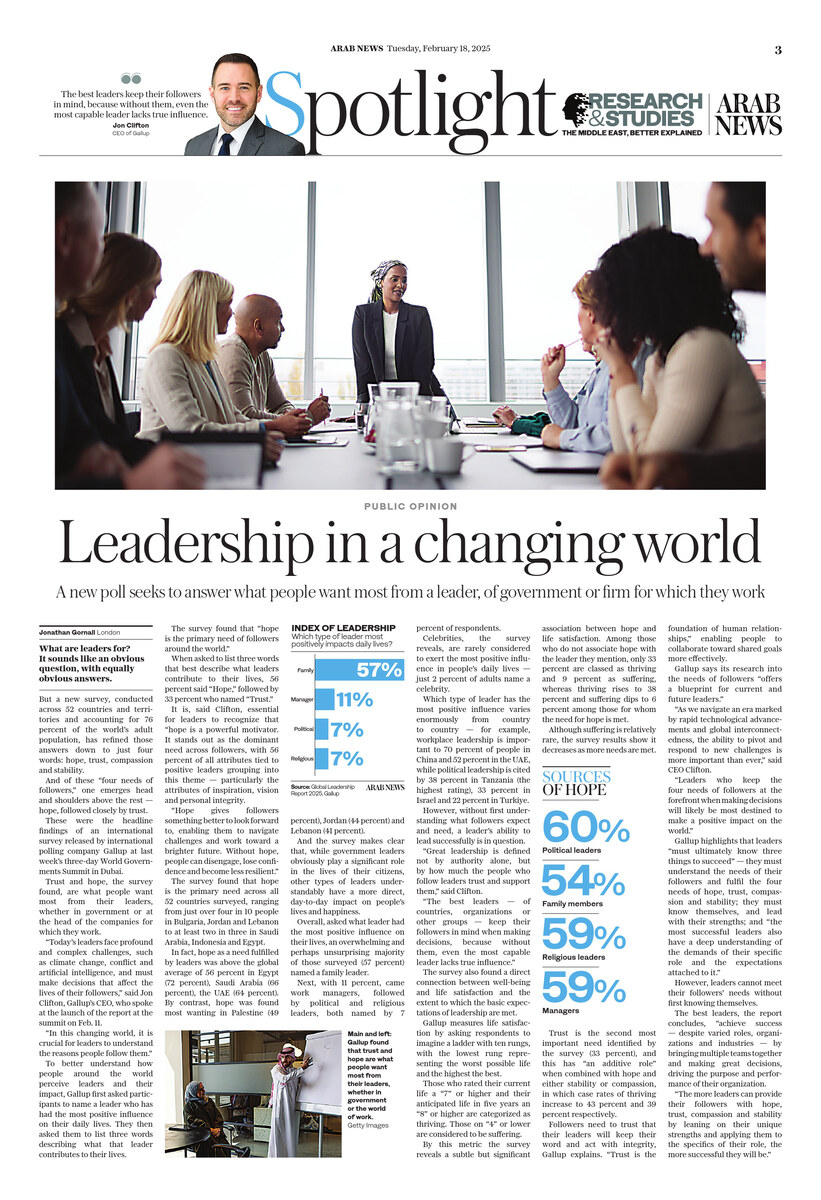LONDON: What are leaders for? It sounds like an obvious question, with equally obvious answers.
But a new survey, conducted across 52 countries and territories and accounting for 76 percent of the world’s adult population, has refined those answers down to just four words: hope, trust, compassion and stability.
And of these “four needs of followers,” one emerges head and shoulders above the rest – hope, followed closely by trust.
These were the headline findings of an international survey released by analytics and advisory company Gallup at last week’s three-day World Governments Summit in Dubai.
The summit, which has been held annually in the city since 2013, brings together heads of government, officials and thought leaders “to address universal challenges and set the agenda for next-generation governments.”
Topics tackled at this year’s summit included the impact of artificial intelligence and how governments can maintain the trust of their citizens in the face of the maelstrom of misinformation and conspiracy theorizing generated in this digital age.

The World Governments Summit in Dubai, which has been held annually since 2013, brings together heads of government, officials and thought leaders “to address universal challenges and set the agenda for next-generation governments.” (AFP)
And trust and hope, the survey found, are what people want most from their leaders, whether in government or at the head of the companies for which they work.
“Today’s leaders face profound and complex challenges, such as climate change, conflict and artificial intelligence, and must make decisions that affect the lives of their followers,” wrote Jon Clifton, Gallup’s CEO, who was present at the launch of the report during the World Governments Summit on Feb. 11.
The “Global Leadership Report: What Followers Want” put it this way: “In this changing world, it is crucial for leaders to understand the reasons people follow them.”
To better understand how people around the world perceive leaders and their impact, Gallup first asked participants to name a leader who has had the most positive influence on their daily lives. They then asked them to list three words describing what that leader contributes to their lives.
The survey found that “hope is the primary need of followers around the world” — a finding that would have come as no surprise to the 19th-century French leader Napoleon Bonaparte, who defined a leader as “a dealer in hope.”
When asked to list three words that best describe what leaders contribute to their lives, 56 percent said “Hope,” followed by 33 percent who named “Trust.”
It is, according to the Gallup report, essential for leaders to recognize that “hope is a powerful motivator. It stands out as the dominant need across followers, with 56 percent of all attributes tied to positive leaders grouping into this theme — particularly the attributes of inspiration, vision and personal integrity.

The Gallup survey found that “hope is the primary need of followers around the world.” (Getty Images)
“Hope gives followers something better to look forward to, enabling them to navigate challenges and work toward a brighter future. Without hope, people can disengage, lose confidence and become less resilient.”
The survey found that hope is the primary need across all 52 countries surveyed, ranging from just over four in 10 people in Bulgaria, Jordan and Lebanon to at least two in three in Saudi Arabia, Indonesia and Egypt.
In fact, hope as a need fulfilled by leaders was above the global average of 56 percent in Egypt (72 percent), Saudi Arabia (66 percent), the UAE (64 percent). By contrast, relatively fewer mentioned hope in Palestine (49 percent), Jordan (44 percent) and Lebanon (41 percent).
And the survey makes clear that, while government leaders obviously play a significant role in the lives of their citizens, other types of leaders understandably have a more direct, day-to-day impact on people’s lives and happiness.
Overall, asked what leader had the most positive influence on their lives, an overwhelming and perhaps unsurprising majority of those surveyed (57 percent) named a family leader.
Next, with 11 percent, came work managers, followed by political and religious leaders, both named by 7 percent of respondents.

Celebrities, the survey reveals, are rarely considered to exert the most positive influence in people’s daily lives — just 2 percent of adults name a celebrity.
Which type of leader has the most positive influence varies enormously from country to country – for example, workplace leadership is important to 70 percent of people in China and 52 percent in the UAE, while political leadership is cited by 38 percent in Tanzania (the highest rating), 33 percent in Israel and 22 percent in Turkiye.
While Gallup’s research into followers’ needs offers valuable insight, the answer to what makes a good leader lies in a holistic understanding of themselves, their role, and the needs of their followers. Without first understanding what followers expect and need, a leader’s ability to lead successfully is in question.
“Great leadership is defined not by authority alone, but by how much the people who follow leaders trust and support them,” the Gallup report said.
“The best leaders — of countries, organizations or other groups — keep their followers in mind when making decisions, because without them, even the most capable leader lacks true influence.”
IN NUMBERS
- 60% of survey respondents say they look for hope in political leaders.
- 54% look for it in family members.
- 59% in religious leaders.
- 59% in managers.
The survey also found a direct connection between wellbeing and life satisfaction and the extent to which the basic expectations of leadership — hope, trust, compassion and stability — are met.
Gallup measures life satisfaction by asking respondents to imagine a ladder with ten rungs, with the lowest rung representing the worst possible life and the highest the best.
Those who rated their current life a “7” or higher and their anticipated life in five years an “8” or higher are categorized as thriving. Those on “4” or lower are considered to be suffering.
By this metric the survey reveals a subtle but significant association between hope and life satisfaction. Among those who do not associate hope with the leader they mention, only 33 percent are classed as thriving and 9 percent as suffering, whereas thriving rises to 38 percent and suffering dips to 6 percent among those for whom the need for hope is met.
Although suffering is relatively rare, the survey results show it decreases as more needs are met. This is especially important in low-income countries, where higher levels of suffering make hope for a better future crucial in reducing pain.

While Gallup’s research into followers’ needs offers valuable insight, the answer to what makes a good leader lies in a holistic understanding of themselves, their role, and the needs of their followers. (Pexels)
Trust is the second most important need identified by the survey (33 percent), and this has “an additive role” when combined with hope and either stability or compassion, in which case rates of thriving increase to 43 percent and 39 percent respectively.
Followers need to trust that their leaders will keep their word and act with integrity, the “Global Leadership Report” says, adding: “Trust is the foundation of human relationships,” enabling people to collaborate toward shared goals more effectively.
The report adds that its research into the needs of followers “offers a blueprint for current and future leaders.”
“As we navigate an era marked by rapid technological advancements and global interconnectedness, the ability to pivot and respond to new challenges is more important than ever,” the report said.
“Leaders who keep the four needs of followers at the forefront when making decisions will likely be most destined to make a positive impact on the world.”

Jon Clifton, CEO of Gallup. (Supplied)
The Gallup report further states that leaders “must ultimately know three things to succeed” — they must understand the needs of their followers and fulfil the four needs of hope, trust, compassion and stability; they must know themselves, and lead with their strengths; and “the most successful leaders also have a deep understanding of the demands of their specific role and the expectations attached to it.”
However, Gallup leaders cannot meet their followers’ needs without first knowing themselves, the report says, adding that effective leaders develop their innate strengths, refining natural talents through knowledge and skill to unlock unique leadership approaches and maximize their impact.
The best leaders, the report concludes, “achieve success — despite varied roles, organizations and industries — by bringing multiple teams together and making great decisions, driving the purpose and performance of their organization.
“The more leaders can provide their followers with hope, trust, compassion and stability by leaning on their unique strengths and applying them to the specifics of their role, the more successful they will be.”


























